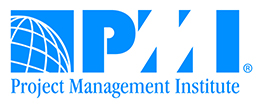Things to know before becoming a PMP – Part Six
So what you will experience in a virtual session is typically the following:
-A large mid-screen area for PowerPoint presentations
-A chat feature for text chatting directly (and privately) with the instructor
-A feature that allows you to virtually raise your hand and be called on
-Student ability to make on-screen annotations and use pointers
-Voice contact either over the computer or by phone
-On-camera instructor (optional)
-Recorded sessions for later viewing
So in this way, the feel of an onsite classroom can be achieved. Now, I recently engaged in an Internet discussion as to whether virtual sessions were as good as onsite sessions. I think we generally agreed that if you are doing exercises such as, say, a work breakdown structure or risk register, there is no substitute for having people collaborate in teams and put stickies on the board. And for those types of PM 101 sessions, I’d still prefer on-site. (And in teaching virtual sessions, I definitely miss body language). But for something like PMP where the goal is to pass an exam and there is a modicum of hands-on exercises, my own track record (and that of my colleagues) says that it works quite effectively. So effectively in fact that we can’t distinguish pass rates of onsite students vs. virtual students. So is virtual for everybody? Well, I think it’s for more people than you might expect. But if you’ve thought about it and it’s not for you, there’s always the onsite option. (I seem to remember seeing one vendor that offered self-study but that was via logging into their web site and viewing videos or reading slides. It’s kind of a hybrid and not entirely sure how it works).
So which option to choose? On-site? Virtual? Boot camp? Self-study? (I have also tutored students one-on-one but that’s rarer). So many choices. I can only lay out the choices for you, I can’t decide for you. But what I always tell my students is I can tell you what to study, I can’t tell you how to study. So you’ll need to think about how you learn best and what mode would be most effective for you. What worked and didn’t work for you in high school and in college? I bet that after reading my descriptions above you’re already leaning in one direction or the other.
As far as how much money you’ll need to spend, well there is no question that self-study is cheapest. Put quite simply, in that case you’re not paying for an instructor. But as to either the onsite or virtual sessions, you’ll have to do some homework. Prices are all over the place on this. I’ve seen as low as $995 to in the $2,000’s. Hopefully I’ve now given you enough things to consider making that decision on your own.
How much time do I need to invest in studying?
I typically recommend that non-boot camp students should expect to study intensely every night for several weeks. (Again, boot camp students study Monday-Thursday and take the test Friday). So you’ll want to be reading, reviewing flash cards, taking self-exams, memorizing your brain dump, etc. Ultimately you’ll want to be self-scoring at about 80 – 85% correct before taking your exam. DO NOT ALLOW A LOT OF TIME TO ELAPSE BETWEEN STUDYING AND TAKING THE EXAM. MAYBE 6 WEEKS MAXIMUM. AFTER THAT YOU START FORGETTING THINGS.
What is the passing score on the exam?
Passing score, unfortunately, is no longer published by PMI. (Some vendors are still quoting 61% which is the last score that PMI published several years ago. This MAY be true but we have no way of corroborating it. If you call or write PMI, they will not tell you a passing score). Rather they score you in proficiencies. So for example, you might score Above Average in Initiating, below average in Closing. They don’t publish the formula for which combination of proficiencies you require either. I have no idea why. There is not 100% consensus in the PMP trainer community about what the passing score might be. I’ve heard anywhere from 65-75% correct but we just don’t know nor will they tell anyone. So as mentioned we typically recommend that you self-score at 80 – 85% correct.
How much work experience do I need in order to apply?
Firstly I suggest you go get the PMP Handbook from the PMI site. That is a rather large document that will tell you everything you need to know and much more than I can detail here. I won’t talk about things such as retake fees, how many times you can take the exam, cancellation fees, etc. That’s all in the handbook.
(Next, information on experience, education, application, price, auditing)


Comments are closed.